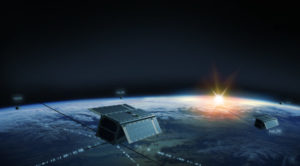
Swiss New Space company Astrocast had its second satellite launched and deployed by the Indian Space Research Organization (ISRO) on its Polar Satellite Launch Vehicle (Mission PSLV-C45) from the Satish Dhawan Space Centre on 1 April 2019. On this second mission Astrocast will focus on a set of propulsion technologies designed for separation, collision avoidance, and de-orbiting.
“It is very important that companies think about the entire lifecycle of their nanosatellites. As a Swiss company, we will lead by example and do everything we can to keep space clean. Using a set of reliable and flight proven technologies, Astrocast is building the ability to control, manoeuvre and ultimately de-orbit its satellites,” said Fabien Jordan, CEO and Founder of Astrocast. “We can avoid collisions from other satellites, easily de-orbit and re-deploy satellites for technology upgrades, and reduce the amount of space debris left at the end of a satellite’s lifecycle. This nanosatellite represents the first of many technology advances we aim to develop toward the security and longevity of our network.”
The ability to control, reposition and de-orbit nanosatellites is key to lessening the amount of space debris that is currently plaguing low-earth orbit missions. Collision avoidance is an ongoing battle. Astrocast aims to be the first to test a series of technologies that will allow greater control and manoeuvrability of its network once it is launched. These technologies include:
- Gas propulsion
- Electric propulsion
- Automatic de-orbiting
- Backup communications
“It is important that companies begin to think long term about the nanosatellites they launch into orbit. Clean nanosatellite technology is possible, and we are taking some of the first steps toward this,” Jordan said.
Astrocast’s first satellite was launched in December 2018 on board a SpaceX Falcon 9 launch vehicle and is fully stabilized with a working payload and is operating nominally.
Astrocast intends to launch 64 nanosatellites in eight orbital plains into low-Earth orbit (LEO) in the coming years in order to provide low cost satellite connectivity for Internet of Things (IoT) devices in remote parts of the world. To help realise this goal, Astrocast has partnered with Airbus Defence and Space, the European Space Agency (ESA), and Dubai, UAE-based Thuraya.
Astrocast is headquartered in Écublens in Switzerland.





